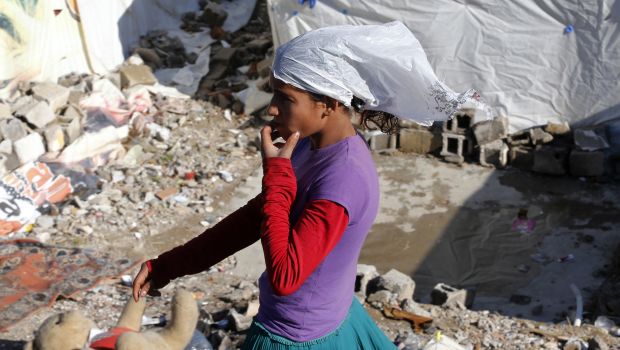
File photo—A female Syrian refugee uses a plastic rubbish bag as a headscarf as she walks through her makeshift tent in central Ankara on October 20, 2013. (REUTERS/Umit Bektas)
Ma’ada and her children had spent seven days sleeping on the streets in Istanbul, and they were not alone. Over the past few weeks, dozens of Syrian refugees have been sleeping in a park in the Aksaray district of the city, showing just how desperate and difficult life has become for the poorest and most vulnerable victims of the conflict. During the day, Ma’ada begs on the street for money and food. She is constantly afraid of being arrested by the police. “If they see us speaking to normal people, we get in trouble,” she said. In the evening, the family huddles together underneath their single blanket and tries to sleep. As winter closes in on the city, the nights are becoming cruelly cold.
Syria’s increasingly bitter and drawn-out civil war has taken almost everything that Ma’ada had. Her husband was killed by a sniper in Aleppo, and her home was destroyed by shelling. She came to Istanbul because she has relatives here, but after staying with them for two days she decided that she had to leave. “There were so many children there, I couldn’t bear it,” she said. She is just seventeen years old—a teenage widow in a strange country with no idea where to go next.
Over the road, Mohammed and his extended family sit on the one mattress and two rugs that mark out their spot on the sidewalk. Twenty-one members of the family fled from Raqqa, having already been displaced there from their homes in Aleppo. “The situation in Raqqa got so bad; there were so many airstrikes,” he said. “If there was nothing, we would have stayed there.” Only twenty of them made it to Istanbul—one of Mohammed’s daughters died from the cold on the way.
“We came here by bus,” Mohammed told me. “At first, we tried to go to the camp at Tel Abyad, but we were told that it was full, that there were no places for us there. So we decided to come here, to look for work.”
But there is little work in Istanbul for a Syrian who speaks no Turkish, and Mohammed says that it would cost at least TRY 100 (USD 50) per night to rent a place for the family to stay. Now, their plan is simply to raise the money to buy bus tickets back to Syria. “We all want to go back, even if we die,” said Mohammed. “This is not a way to live, our women sitting in the street and everyone looking at us.”
Just six miles away from where Ma’ada and Mohammed sat on Aksaray’s cold streets, members of the Syrian National Coalition gathered earlier this month in a five-star hotel to discuss the proposed Geneva II conference. This was the other face of the Syrian war—the politics, power play and endless discussions that do little to improve the misery of the millions of Syrians like Ma’ada and Mohammed, whose lives have been shattered to a point that seems beyond repair.
Almost every day, the Coalition puts out new press releases about the worsening situation in Syria. Every time, they sign off with the same words: “Long live Syria and its people, free and with honor.” But when I asked Ma’ada and Mohammed whether anyone from the Coalition had come to Aksaray to speak to them and to see the situation that they are in, they both told me that they had not seen anyone.
Syria’s politics matters little to people like Ma’ada and Mohammed—what matters most is food and shelter, and the opposition’s politicians seem to be able to do little to provide it for them. And while freedom and honor may be worthy concepts, they are goals that feel far more realistic from the comfort of a hotel conference room than from a grimy mattress on the streets of Istanbul.
This article was originally published in The Majalla.
All views expressed in this blog post are those of the author and do not necessarily represent the views of, and should not be attributed the The Majalla magazine or Asharq Al-Awsat newspaper.

Trackbacks/Pingbacks